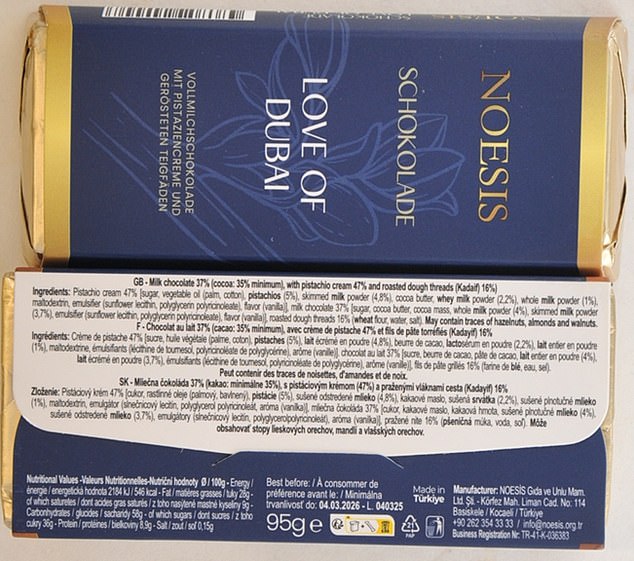[ad_1]
A cult Dubai chocolate bar has been urgently recalled by UK food safety chiefs over fears it could trigger fatal allergic reactions.
The Neosis Schokolade Love of Dubai bar, a foil-wrapped sweet sold in independent shops and online, contains undeclared peanuts, according to officials.
The product is part of a wave of imported Middle Eastern-style chocolates that have surged in popularity thanks to social media—but concerns are growing that many of these bars fail to meet UK food safety standards.
The Food Standards Agency (FSA) has issued a ‘do not eat’ warning and ordered an immediate recall, saying the 95g bar poses a serious risk to people with a peanut allergy.
All batch codes and best-before dates are affected.
The bar is manufactured in Turkey and distributed in Britain by Black Sea Trading Ltd—a company the FSA said has so far been uncontactable.
Officials are working with local authorities to ensure the product is removed from sale, and are advising anyone who has purchased it to dispose of it and report where it was bought.
Undeclared peanuts can cause anaphylaxis—a rapid, life-threatening allergic reaction that causes the throat to swell, often leading to unconsciousness or death within minutes.

The Neosis Schokolade Love of Dubai bar, a foil-wrapped sweet sold in independent shops and online, contains undeclared peanuts, according to food safety officials

Middle Eastern-style chocolates that have surged in popularity thanks to social media—but concerns are growing that many of these bars fail to meet UK food safety standards
As part of the recall notice, the FSA stated: ‘This product contains peanuts, making it a possible health risk for anyone with a peanut allergy. If you have bought it, do not eat it.’
The recall follows mounting concerns over the so-called Dubai chocolate trend, which has seen pistachio-stuffed, gold-wrapped sweets go viral on social media.
While some UK supermarkets have launched their own regulated versions, many of the bars being sold by smaller retailers and online are unregulated imports.
The are often missing English ingredient lists, allergen warnings, or valid UK contact details, the FSA has warned.
Earlier this year, testing by European authorities found that some Dubai-style chocolates contained undeclared sesame, banned artificial dyes, and even carcinogenic contaminants.
In one case, German investigators reported ‘widespread safety violations’ in imported pistachio chocolate bars, including the presence of aflatoxins—toxic compounds linked to liver cancer.
In June the FSA urged the public to check labels on Dubai-style chocolate bars and not purchase them if they do not list, in English, the ingredients with allergens emphasised.
The weight of the food in grams, and a best before or use by date should be printed clearly.
The name and address of the UK or EU business responsible for the product should be listed, and if the food is not from the UK or EU, the name and address of the importer must be included.

Natasha Ednan-Laperouse, 15, collapsed on a flight after eating a Pret a Manger baguette containing sesame, which was not listed on the packaging
Experts have warned that the popularity of these sweets is ‘outpacing food safety,’ with campaigners calling for tighter import controls and better enforcement of allergen labelling laws.
The recall comes after a series of high-profile tragedies linked to unlabelled allergens.
In 2016, 15-year-old Megan Lee died after eating takeaway food that failed to declare peanuts. The restaurant owners were later jailed for manslaughter by gross negligence.
A year later, Natasha Ednan-Laperouse, also 15, collapsed on a flight after eating a Pret a Manger baguette containing sesame, which was not listed on the packaging.
Her death led to the introduction of Natasha’s Law, requiring full allergen labelling on pre-packed foods.
The FSA said the recall of Neosis Schokolade Love of Dubai is listed under alert code FAFA-03-2025. Full details are available on its website.
Anyone who experiences swelling, rash, difficulty breathing or dizziness after eating the product is urged to seek immediate medical attention.
[ad_2]
This article was originally published by a www.dailymail.co.uk . Read the Original article here. .

